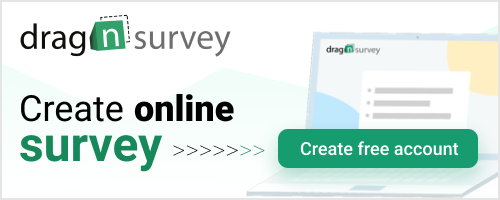When you’re an entrepreneur, you’ll want to get as much information as possible. There are several ways to do so. The first is to look for and collect data from websites. There are various websites that collect statistics that can provide you with a vast amount of information. However, these often offer little context or depth of data.
Another way of getting information is from the use of surveys. This can take the pulse of specific audiences to get data in context that is valuable. This can also be the case because data found online can be from the wrong area or with the wrong demographics.
However, the value of surveys is only so much unless you ask the right questions in the right manner. So, here are some tips on how you can ask the right queries to benefit you as an entrepreneur.
>> Create your Online Survey with Drag’n Survey, click here

1. Limit The Number Of Questions In Your Survey
The first thing to do is to consider how many questions you are asking. Surveys that are too long have high abandonment rates, regardless of how the queries are asked. Surveys should be about five to ten questions at the most. Just enough time that they take about five to ten minutes to complete.
The more complex the queries, the less there should be in the survey. For instance, if you have lots of open-ended queries, then you should have fewer of them. Perhaps only three if you can get all the information from that limited number.
2. Thank Those Who Are Helping You Out
One of the biggest problems that entrepreneurs face, as they’re asking people to complete questionnaires is that audiences don’t appreciate being interrupted in their daily lives. At the end of the day there is very little benefit to the respondents. You can overcome this by being more sympathetic and explaining why you need them to complete the form.
In addition, you should look at saying thank you for their time before and after the survey. Give them the main reason why they are completing the survey for you. Research has found that when given a reason, people are more willing to comply with requests.
3. Follow The Simple Rules When It Comes To Writing Questions
There are various rules when it comes to writing questions. We’ve talked about the simple writing rules for queries in previous articles. However, here are some of the basic rules that you should be following as a reminder:
- – Don’t use double negatives. This can confuse audiences and they will provide information that is inaccurate. It also reflects negatively on your personality, which in turn can cause significant problems in retaining audiences for your business.
- – Ask for one piece of information in each query. This prevents audiences from trying to fit in too much information or leaving information out because they answer only part of your query. For instance: ‘how regularly do you use our facilities and why?’ should be split into two.
- – Keep jargon out of the content and questions. This can only confuse audiences and respondents and can lead to a bias. Instead, simplify the wording of questions so that anyone can understand what you’re asking. If in doubt, why not ask someone in your office or a friend/family member to proof-read your survey.
- – When using a sliding scale for answers (i.e. 1-5 or very likely to very unlikely), try to remove neutral stances as much as possible. Many have found that by including neutral positions, they get a high ratio of neutral responses. This is probably because respondents don’t want to annoy the brand or insult them. But it can also be a sign that the respondent has no emotional need to complete the survey honestly and this is the simplest choice that will require less follow-up.
- – Always check your spelling. Grammar mistakes on websites can cost you a small fortune and a spelling mistake on a survey can reduce the quality of the content you get back from your audience. Therefore, always check your work for spelling and grammar mistakes. There are plenty of online free grammar checkers that allow you to do this. And you can always call on the services of a proof-reader to make sure.
4. Always Make Sure You’re Asking For The Information You Need
Last but not least, you should always make sure that you’re asking for the information that you need. Every question should be looked at two or three times to check it isn’t asking for the same information as a previous question or that it adds value to your final goal. For instance, if you’re looking for responses about how much people are willing to pay to join a gym, is asking what exercise they do at home going to help?
Conclusion
Being an entrepreneur is challenging at times. However, you can get all the information you need to help you formulate and improve upon business ideas by using a survey. Use the above tips to help you generate a questionnaire that will help you get the data you need and see success.
More about surveys:
How Your Survey Can Help Trigger Profitable Revenue, click here
Four Tips For Developing Meaningful Survey Questions, click here
Entrepreneurial Best Practices For Using Surveys, click here
How to Close Out A Survey – Don’t Write This Question, click here
Make Better Decisions With Better Data, click here
